Feed
-
Call for Thought Pieces Regarding Race and Ethnicity in Africa and the DiasporaAAP is issuing a call for thought pieces from anywhere in the world that are short, critical reflections of issues around race and ethnicity in higher education institutions as well as other key stakeholder organizations in Africa and the African Diaspora. The first deadline for thought piece summary (up to 500 words) is Oct. 30, 2021. Summaries must include title, text, author’s name and affiliation. For the full call for contributions and submission details, visit the link below. https://aap.isp.msu.edu/engage/aap-perspectives/By: Raquel AcostaFriday, Oct 1, 2021CULTURE AND SOCIETY+1
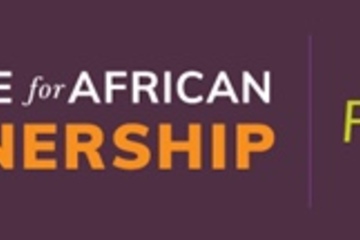
-
CFA: Endangered Archives Programme Call for Applications is OpenThe Endangered Archives Programme is now accepting preliminary applications for the next annual funding round – the deadline for submission of preliminary applications is Monday 15 November 2021 at 12 noon GMT. Full details of the application procedures and documentation are available on the EAP website (https://eap.bl.uk/applicants). The Programme has funded over 430 projects in 90 countries and has helped preserve manuscripts, rare printed books, newspapers and periodicals, audio and audio-visual materials, photographs and artwork. The programme aims to digitise archives at risk of loss or decay and, where appropriate, to relocate the material to a safe local archival home. The digital copies are deposited with the local archival partners, and are all available for researchers to access freely through the British Library website. This year, we are accepting applications through our online portal between 1st and 15th November. However, in the meantime, we are providing Word and PDF documents for applicants to perfect their preliminary applications before the online submission. If you know of an archive in a region of the world were resources are limited, we really hope you will apply. If you have any questions regarding the conditions of award or the application process, consult our website (https://eap.bl.uk) or contact them at endangeredarchives@bl.ukBy: Raquel AcostaFriday, Oct 1, 2021EDUCATION
No Preview Available -
Agri4D 2021 conference "Food Systems for New Realities"The Agri4D 2021 conference "Food Systems for New Realities" will take place at SLU (virtually) on 28-30 September. The Agri4D conference has been Organised by SLU Global at the Swedish University of Agricultural Sciences (SLU) and the Swedish International Agriculture Network Initiative (SIANI), with support from the Swedish International Development Cooperation Agency (Sida). Agri4D will bring together researchers, policy makers and practitioners to engage actively with the challenges of food systems with a focus on low-income contexts in a globalised world. The conference aims to be a platform to take stock of the current knowledge frontier, connect science to policymaking and practice, and spark new collaborations. For more information please visit: https://www.slu.se/en/collaboration/international/slu-global/agri4d-conference/. To register: Agri4D - Agricultural Research for Development Conference 2021 (akademikonferens.se)By: Raquel AcostaThursday, Sep 23, 2021AGRI-FOOD SYSTEMS
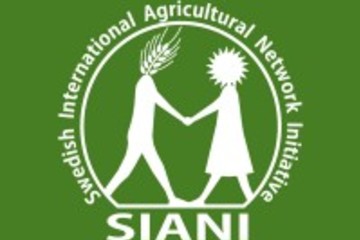
-
Biodiversity Media Grants 2021Many of the threats currently facing global biodiversity have been exacerbated during the Covid-19 pandemic. Funding for critical conservation and ecotourism projects has been redirected or lost, economic growth has been prioritized over protecting wild spaces, and media coverage of the outbreak has dwarfed reporting on conservation. Indeed, the biodiversity crisis is one that impacts all of humanity and has not received the media coverage that it deserves. Media organizations and reporters have an important part to play in raising public awareness of biodiversity and conservation issues, and highlighting potential solutions to these problems. As a part of the Earth Journalism Network’s Biodiversity Media Initiative project, we are pleased to announce a second round of grant opportunities for journalist networks, media organizations, civil society organizations or academic institutions that are working to improve media coverage of biodiversity and conservation issues in countries where information is most under threat and most urgently needed. The Biodiversity Media Grants will support projects that: Build the capacity of journalism networks and media organizations to report on biodiversity and conservation issues Carry out biodiversity and/or conservation training activities for journalists Build internal capacity Organize local networks around these issues We are especially interested in projects that focus on conservation in biodiversity-rich regions of the world, such as the Amazon, Central Africa and Southeast Asia. For more information on the funding opportunity or to apply, visit the Earth Journalism Network websiteBy: Derek TobiasThursday, Sep 23, 2021WATER, ENERGY, AND THE ENVIRONMENT
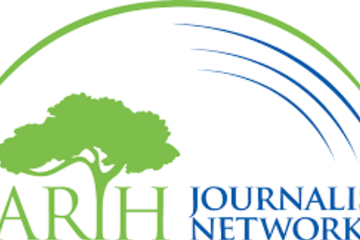
-
The Milken-Motsepe Prize in AgriTechThe inaugural Milken-Motsepe Prize focuses on accelerating progress towards Sustainable Development Goals (SDGs) 1 and 2: no poverty and zero hunger. The Milken-Motsepe Prize in AgriTech is a global competition for innovative solutions to increase economic value to farmers, from seed to sale. Registration is open to anyone.Winning teams will increase net economic value to small and medium-sized farms by: Developing innovative technology solutions for any stage of the food system, from seed to sale Designing a viable business model Increasing farm productivity and/or decreasing post-harvest loss Registration is free and open to anyone, with a $1 million grand prize available for the winning team, and $1 million in additional prizes. For more information or to apply, please visit the Milken-Motsepe Prize webpage.By: Derek TobiasMonday, Sep 20, 2021AGRI-FOOD SYSTEMS
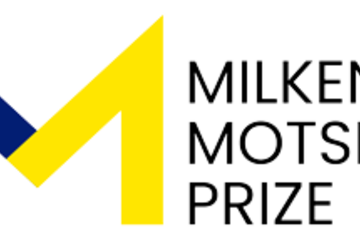
-
UN Food Systems Summit High Level Side Event Delivering on the African Agenda in Building ResilientDuring the 2021 AGRF Summit 6-10 September, six African presidents joined by 8,000 delegates aligned with the African common position on building resilient food systems. Their shared vision will help achieve a transformation to improve livelihoods, defeat hunger and tackle malnutrition. To highlight the national pathways and partner actions, on September 21 from 6–7:30 PM (EAT) AGRA and the AGRF will host “Delivering on the African Agenda in Building Resilient Food Systems” a side event ahead of the UN Food Systems Summit. It will address African challenges and solutions in the transition to resilient food systems. Following the declaration (https://agrf.org/summit#summit-declaration) of the AGRF, it will consider what must be done to turn political ambition into reality. The event will be moderated by William Asiko, Managing Director of the Rockefeller Foundation’s Africa Region Office. Provisional speakers include: H.E. Hailemariam Dessalegn, Former Prime Minister of Ethiopia, Chair AGRF Partners Group and Chair AGRA Board Jim Barnhart, Assistant to the Administrator, Bureau for Resilience and Food Security, USAID Ms. Evangelista Chekera, CEO Passion Poultry Hon. Peter Munya, Cabinet Secretary, Ministry of Agriculture, Livestock, Fisheries and Cooperatives, Republic of Kenya Elizabeth Nsimadala, President, Pan-Africa Farmers Organization (PAFO) H.E. Ken Ofori-Atta, Minister for Finance and Economic Planning, Republic of Ghana H.E. Josefa Sacko, Commissioner Agriculture, Rural Development, Blue Economy and Sustainable Environment, African Union Commission Jai Shroff, UPL Limited CEO Rodger Voorhies, President, Global Growth and Opportunity Division, Bill and Melinda Gates Foundation Please join us on September 21 at 6pm EAT (Nairobi time). Click here to register for the event.By: Derek TobiasMonday, Sep 20, 2021AGRI-FOOD SYSTEMS
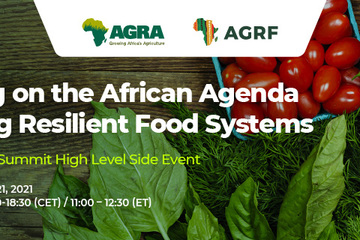
-
AAP Public Dialogue Series 2021AAP is excited to be hosting our next Public Dialogue “The Engaged University: Working with policy makers, the private sector, and communities to advance African higher education transformation” on Wednesday, September 22nd at 9:00am-10:30 EDT. This dialogue session will be co-hosted by our affiliates at @The University of Botswana and those at @SARUA. This session will examine innovative strategies for African universities to engage across all sectors and the impact these engagements are having on the transformation of the African higher education sector. AAP recognizes that universities are now seeing themselves as catalysts for positive change in their communities and beyond, and is proud to be a part of this progress. This series will be done with the help of @University World News as AAP’s media partner.By: Raquel AcostaThursday, Sep 16, 2021EDUCATION

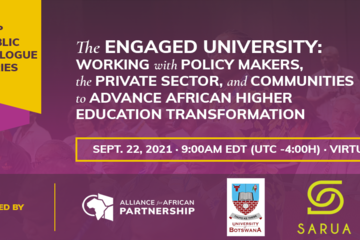
Leave a comment